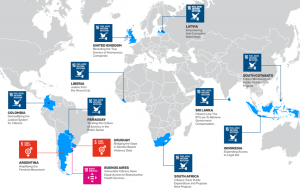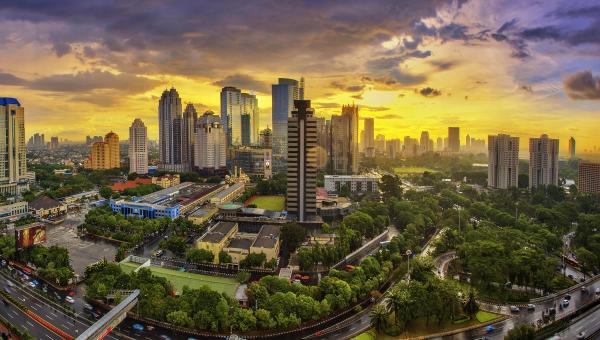How Local Governments Engage with httpssdg2030indonesia.org to Drive Change
In recent years, the role of local governments in fostering sustainable development has gained unprecedented momentum. As we strive towards the ambitious goals set by the Sustainable Development Goals (SDGs), local authorities have become crucial actors in translating these global directives into actionable initiatives at the grassroots level. Among various platforms advocating for sustainable practices, the website https://sdg2030indonesia.org/ stands out as a dedicated resource that facilitates this engagement. This article explores how local governments engage with this platform to drive meaningful change within their communities. Posted by https://sdg2030indonesia.org/
Understanding the Role of Local Governments

Local governments are vital in implementing policies and programs that align with the SDGs. Their proximity to communities allows them to identify local needs and tailor solutions accordingly. The significance of local governance in this context cannot be overstated, as they act as a bridge between national objectives and community-level actions.
Community Engagement and Participation
One of the primary roles of local governments is to foster community engagement and participation in decision-making processes.
To achieve this, local officials utilize various strategies, including public forums, surveys, and collaborative projects. These efforts ensure that the voices of citizens resonate within local governance structures.
Furthermore, engaging the community creates a sense of ownership over local initiatives. When residents feel included in decision-making, they are more likely to support and participate in sustainability efforts.
Capacity Building and Training
Another essential aspect of local government engagement with the SDGs is capacity building. Local authorities often organize training sessions and workshops aimed at enhancing the skills and knowledge of both employees and the community.
By investing in education and capacity development, local governments equip individuals and organizations with the tools needed to tackle local challenges effectively. This training can encompass a variety of topics, from environmental conservation techniques to understanding economic sustainability.
Policy Integration and Alignment
Local governments also play a strategic role in integrating SDG-related policies into their existing frameworks. They assess existing legislation and identify areas where changes can be made to better align with the SDGs.
This process involves collaboration with various stakeholders, including civil society organizations, private sectors, and community members. Policy alignment not only promotes coherence in development strategies but also strengthens the overall impact of local initiatives.
Leveraging Technology and Innovation

In the current digital age, technology serves as a powerful ally in advancing sustainable development. Local governments utilize various technological tools and innovative practices to enhance their engagement with the SDGs.
Utilizing Digital Platforms for Communication and Outreach
Digital platforms have revolutionized how local governments communicate with their constituents. Through websites, social media, and mobile applications, local authorities can disseminate information about SDG initiatives and gather feedback from the community.
This two-way communication fosters transparency and accountability. Citizens can voice their opinions, concerns, and suggestions, leading to more informed decision-making processes.
Implementing Smart City Initiatives
Local governments are increasingly adopting smart city initiatives that leverage data and technology to improve urban management and sustainability.
These initiatives can range from intelligent waste management systems to energy-efficient building designs. By collecting and analyzing data, local authorities can make informed decisions that enhance environmental outcomes while promoting economic growth.
Encouraging Innovation through Partnerships
Collaboration with research institutions, NGOs, and the private sector is crucial for fostering innovation. Local governments often partner with various entities to develop new technologies and practices that advance the SDGs.
For instance, local governments might collaborate with tech startups to create apps that track carbon emissions or provide platforms for citizen engagement. Such partnerships not only facilitate knowledge transfer but also spark creativity in addressing local challenges.
Case Studies of Successful Local Government Engagement

Real-world examples illustrate the significant impact local governments can have when engaging with sustainable development initiatives, especially through platforms like https://sdg2030indonesia.org/.
Success Stories from Indonesian Cities
Indonesia provides several remarkable case studies where local governments have successfully integrated the SDGs into their planning and operations.
One notable example is the city of Bandung, renowned for its commitment to sustainability. The local government actively engages with community members through participatory planning processes, ensuring that the city's development aligns with the aspirations of its residents.
Bandung's initiatives include green open spaces, efficient public transportation, and waste-to-energy projects. These efforts demonstrate how local governments can harness community engagement to drive meaningful changes toward the SDGs.
Collaboration with Civil Society Organizations
Local governments have also formed impactful collaborations with civil society organizations to implement sustainability projects.
An illustrative case is Jakarta’s partnership with various NGOs focused on improving clean water access. By combining resources and expertise, local authorities and NGOs have launched successful campaigns and infrastructure improvements that contribute to achieving SDG 6: Clean Water and Sanitation.
These collaborations showcase the importance of multi-stakeholder approaches in driving sustainable change at the local level.
Innovative Practices in Rural Areas
While urban centers often receive considerable attention regarding sustainability, rural local governments are equally active in promoting the SDGs.
Take, for instance, a rural district in East Java that implemented an organic farming initiative. The local government engaged farmers through educational programs and provided resources for transitioning to organic agriculture. This effort enhances food security while supporting SDG 2: Zero Hunger.
Such initiatives highlight the potential for rural local governments to contribute significantly to sustainable development while addressing unique challenges faced by their communities.
Challenges and Barriers to Effective Engagement

Despite the promising potential of local governments to drive sustainable development, numerous challenges hinder effective engagement with the SDGs.
Limited Resources and Funding Constraints
Many local governments operate under constrained budgets, making it difficult to allocate funds for extensive sustainability initiatives.
The lack of financial resources can lead to limited capacity in terms of staffing, training, and program implementation. Consequently, this hampers the ability of local authorities to engage meaningfully with the SDGs and fulfill their commitments.
Insufficient Data and Information Access
Another challenge is the varying levels of access to data and information. Local governments need accurate and up-to-date data to inform their decisions and measure progress towards the SDGs.
However, many local authorities struggle with inadequate data collection mechanisms and insufficient support from central governments. This gap inhibits their ability to plan effectively and assess the impact of their initiatives accurately.
Resistance to Change
Cultural and institutional resistance can also impede local governments' engagement with sustainable development practices.
Traditional mindsets and established practices may pose barriers to adopting innovative approaches necessary for achieving the SDGs. Overcoming this resistance requires strong leadership and a commitment to fostering a culture of collaboration and adaptability.
FAQs

What are the main roles of local governments in achieving SDGs?
Local governments primarily focus on community engagement, policy integration, capacity building, and leveraging technology to address local challenges and drive sustainable development.
How can local governments effectively involve communities in sustainability efforts?
Local governments can hold public forums, utilize surveys, and foster collaborative projects to encourage community participation in sustainability initiatives.
In what ways do local governments leverage technology for SDG engagement?
Local governments use digital platforms for communication, adopt smart city initiatives, and foster innovation through partnerships with various stakeholders.
Can you provide examples of successful local government engagement in Indonesia?
Cities like Bandung and Jakarta exemplify success through participatory planning processes and partnerships with NGOs for clean water access, showcasing impactful local initiatives aligned with the SDGs.
What challenges do local governments face in engaging with SDGs?
Challenges include limited resources and funding constraints, insufficient data access, and cultural resistance to change, all of which can hinder effective engagement with sustainable development initiatives.
Conclusion
Local governments play an indispensable role in achieving the Sustainable Development Goals, particularly through platforms like https://sdg2030indonesia.org/. Their engagement can translate global aspirations into localized actions that address specific community needs. By prioritizing community participation, leveraging technology, and sharing successful case studies, local authorities can foster a culture of sustainability that drives meaningful change. However, they must also navigate challenges such as limited resources and resistance to change. Ultimately, the commitment of local governments to engage with the SDGs will be pivotal in shaping a sustainable future for all.
מאמרים נוספים



